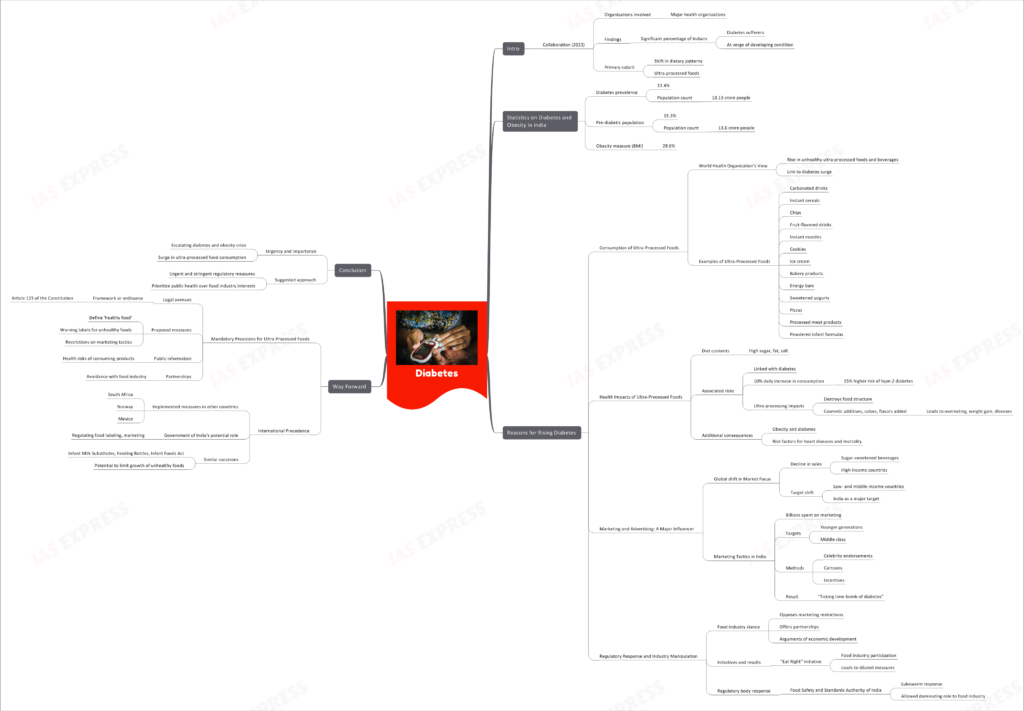Diabetes- Prevalence, Concerns & Required Measures
From Current Affairs Notes for UPSC » Editorials & In-depths » This topic
IAS EXPRESS Vs UPSC Prelims 2024: 85+ questions reflected
In a recent collaboration between major health organizations in 2023, it was revealed that a significant percentage of India’s population is suffering from diabetes or is on the verge of developing the condition. The drastic shift in dietary patterns, driven by the influx of ultra-processed foods, is among the leading culprits.

Statistics on Diabetes and Obesity in India
- Population with Diabetes: 11.4% (10.13 crore people)
- Pre-diabetic Population: 15.3% (13.6 crore people)
- Obesity Percentage as per BMI: 28.6%
Reasons for Rising Diabetes
Consumption of Ultra-Processed Foods
- World Health Organization’s View: The surge in diabetes is attributed to the rise in consumption of unhealthy ultra-processed foods and beverages.
- Examples of Ultra-Processed Foods: Carbonated drinks, instant cereals, chips, fruit-flavored drinks, instant noodles, cookies, ice cream, bakery products, energy bars, sweetened yogurts, pizzas, processed meat products, powdered infant formulas.
Health Impacts of Ultra-Processed Foods
- Diets high in sugar, fat, and salt are linked with diabetes.
- A 10% daily increase in ultra-processed food consumption leads to a 15% higher risk of type-2 diabetes.
- Ultra-processing destroys food structure, and the addition of cosmetic additives, colors, and flavors can make people overeat, leading to weight gain, diabetes, and other diseases.
- Obesity and diabetes are major risk factors for heart diseases and mortality.
Marketing and Advertising: A Major Influencer
- Shift in Market Focus: Declining sales of sugar-sweetened beverages in high-income countries have led companies to target low- and middle-income countries like India.
- Marketing Tactics in India: Companies spend billions on marketing ultra-processed foods to vulnerable populations. They target younger generations, the middle class, and use celebrity endorsements, cartoons, and incentives.
- Resultant health crisis is referred to as the “ticking time bomb of diabetes.”
Regulatory Response and Industry Manipulation
- The food industry opposes marketing restrictions and offers partnerships while leveraging arguments of economic development.
- Initiatives like “Eat Right” see food industry participation, leading to diluted regulatory measures.
- The Food Safety and Standards Authority of India’s lukewarm response allows the food industry to have a dominating role.
Way Forward
Mandatory Provisions for Ultra-Processed Foods
- A legal framework or ordinance (based on Article 123 of the Constitution) should be implemented to reduce or halt the consumption of ultra-processed foods.
- Measures might include defining ‘healthy food’, adding warning labels to unhealthy foods, and imposing restrictions on promotion and marketing tactics of such foods.
- The public should be informed of the health risks of consuming these products.
- Avoid partnering with the food industry, which contributes to the health crisis.
International Precedence
- Governments of South Africa, Norway, and Mexico have recently implemented similar actions.
- The Government of India should demonstrate its strength in regulating food labeling and marketing.
- Drawing parallels from The Infant Milk Substitutes, Feeding Bottles, and Infant Foods Act, a new law could limit the growth of unhealthy foods and beverages.
Conclusion
The escalating crisis of diabetes and obesity in India, fueled by the surge in ultra-processed food consumption, necessitates urgent and stringent regulatory measures. Drawing inspiration from international successes, India must prioritize its public health over the interests of the food industry.
Practice Question for Mains
Diabetes is a ticking time bomb that needs diffusing. Elaborate. (250 words)
If you like this post, please share your feedback in the comments section below so that we will upload more posts like this.

